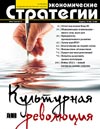Cultural Revolution
Opening address of editor-in-chief.

Opening address of editor-in-chief.
This article provides details of characteristics of the organization and functioning of cooperation between state, industry and science in the science and technology. Special attention is paid by the issues of innovation policy in Japan and its place in the industrial policy in general.
None of the world powers is interested in changing the consolidated image of Russia as the supplier of hydrocarbons, metals, chemical fertilizers, fish and seafood.
Russia’s accession to the WTO after 18 years of painful reflections.
Will Russia win a great nano-racing? Probably not! Corruption, powerful lobby groups which consume a significant part of financial resources, an aging staff and inadequate measures of power structures determine stagnation processes. On the world arena Russia is step by step giving up its advantage to more ambitious, energetic and purposeful.
In fact, many Russian industries have been long operating under the WTO conditions, gradually gaining weight in the world “table of ranks”. To consolidate their position they had not only to change radically the industrial-technological structure, but also to master pretty tough methods of management and organization of commercial and legal services.
In the post-crisis period our country has passed to a reduced trajectory of socio-economic growth.
Can nuclear power become “profitable self-developing business”?
Suburban traffic affects the interests and possibly even quality of life of tens of millions of people, for that reason the problem gains in political significance.
Having won the Patriotic War in 1812, the Russian people saved their mother country from foreign oppression, defended its honor and independence.